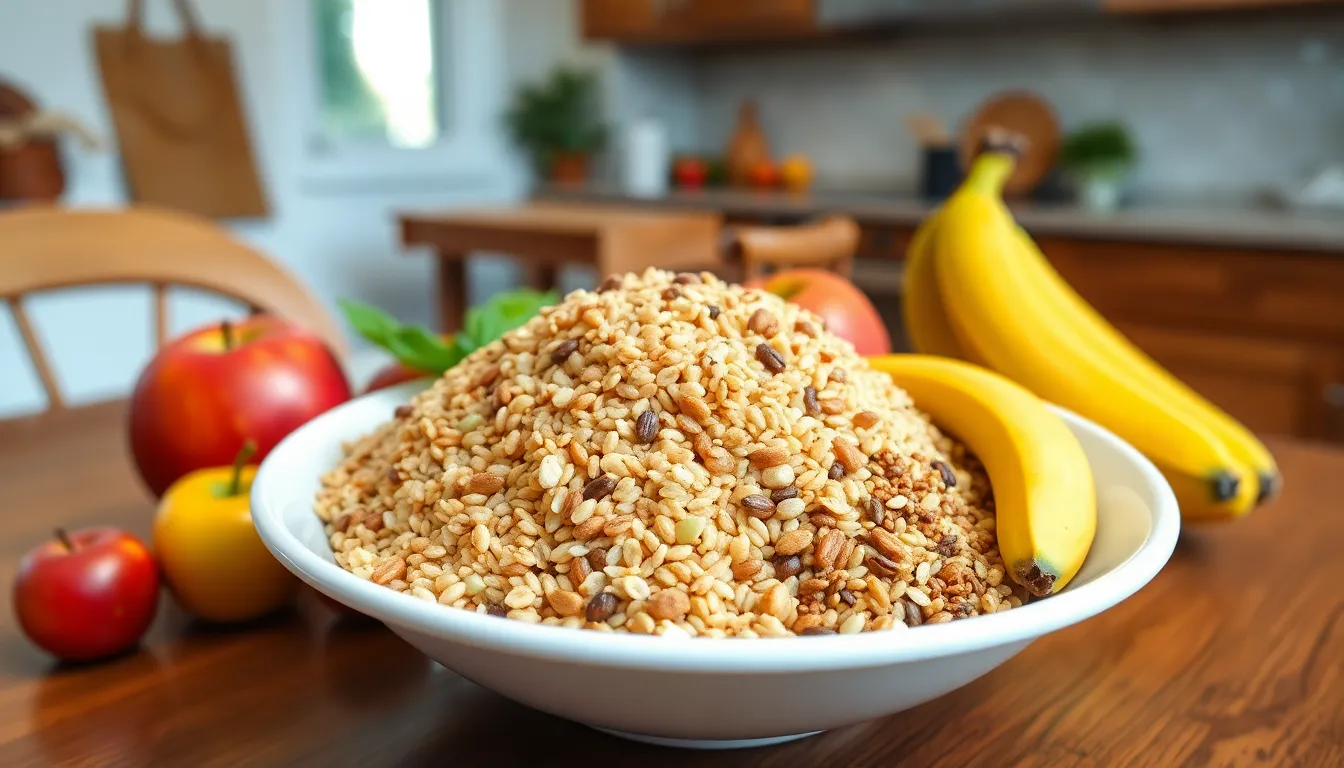Phone:
(701)814-6992
Physical address:
6296 Donnelly Plaza
Ratkeville, Bahamas.

In a world filled with trendy diets and superfood fads, it’s easy to forget the basics. But let’s face it: without the right nutrients, even the fanciest kale smoothie won’t save the day. Meet the six nutrients that are the unsung heroes of a balanced diet. They’re like the Avengers of your plate, each with unique powers ready to boost health and vitality.
Essential nutrients support overall health and energy. Carbohydrates provide the body’s primary energy source, powering daily activities. Proteins play a vital role in repairing tissues and building muscles. Fats contribute to cell structure and hormone production, also storing energy efficiently.
Vitamins are crucial for various bodily functions, including immune support and metabolism regulation. Each vitamin type, such as A, B, C, D, E, and K, offers unique benefits. Minerals, including calcium, potassium, and iron, are important for bone health, fluid balance, and oxygen transportation in the blood.
Water serves as an essential nutrient, aiding in digestion and temperature regulation. Maintaining hydration supports nutrient transport and waste removal. A combination of these nutrients creates a balanced diet, ensuring the body functions optimally.
Incorporating whole foods rich in these six nutrients promotes long-term health. Foods like fruits, vegetables, whole grains, lean meats, and healthy fats enhance nutrient intake. Regularly consuming a variety of these foods strengthens the body and improves vitality, making adherence to essential nutrient intake crucial for wellness.


Carbohydrates represent the body’s primary energy source. They play a critical role in overall health and performance.
Carbohydrates fall into two main categories: simple and complex. Simple carbohydrates include sugars like glucose and fructose, found in fruits and processed sweets. Complex carbohydrates comprise starches and fibers, present in whole grains and legumes. Whole grains like brown rice and quinoa offer essential nutrients and energy. Fruits and vegetables provide vitamins alongside carbohydrates. Fiber, important for digestive health, can be found in foods like beans, oats, and carrots. Understanding these types helps in choosing the right carbohydrates for daily diets.
Carbohydrates serve several vital functions within the body. They provide immediate energy during physical activities. The brain relies on glucose, a simple sugar, for optimal function and cognitive performance. Additionally, carbohydrates aid in muscle recovery through glycogen replenishment after intense exercise. They facilitate the digestion of food, particularly fiber-rich varieties that promote gut health. Hormonal balance is also influenced by carbohydrate intake, ensuring energy levels remain stable. Prioritizing the right types of carbohydrates enhances overall nutrition and supports sustainable energy.
Proteins serve as building blocks for the body, contributing to muscle growth, repair, and overall health. Essential for various functions, proteins play a significant role in almost every bodily process.
Proteins play a crucial role in body composition and physical performance. Tissue repair relies heavily on protein intake, while muscle building requires adequate protein consumption after workouts. Immune function benefits from proteins, as they assist in creating antibodies that fight infections. Hormonal balance also depends on proteins, which are vital for producing various hormones in the body. Individuals aiming for weight management can find proteins particularly beneficial, as they promote satiety and can help curb appetite.
Protein sources come in various forms, including both animal and plant-based options. Lean meats like chicken, turkey, and fish provide high-quality protein. Dairy products such as Greek yogurt and cottage cheese offer additional sources of protein while also supplying calcium. Plant-based options include legumes like lentils and chickpeas, which deliver substantial protein alongside fiber. Nuts and seeds also contribute protein while providing healthy fats. Whole grains, such as quinoa and farro, contain protein as well and can be incorporated into various meals. Prioritizing a diverse range of protein sources ensures optimal nutrition and supports overall health.
Fats play a crucial role in a balanced diet, offering essential benefits that support overall health and vitality.
Three primary types of fats exist: saturated, unsaturated, and trans fats. Saturated fats are typically solid at room temperature and found in animal products like butter and cheese. Unsaturated fats, including monounsaturated and polyunsaturated fats, come from plant sources like olive oil, avocados, and nuts. These fats remain liquid at room temperature and are known for their heart-healthy benefits. Trans fats, often found in processed foods, pose health risks and should be limited. Prioritizing unsaturated fats over saturated and trans fats leads to better heart health and overall well-being.
Fats serve several vital functions within the body. They contribute to cell structure, forming essential components in cell membranes. Hormone production relies on fats as well, influencing various physiological processes. Energy storage plays a key role, as fats provide a concentrated energy source, yielding more than double the calories of carbohydrates and proteins. Additionally, fats aid in the absorption of fat-soluble vitamins A, D, E, and K, ensuring adequate nutrient uptake. Prioritizing healthy fats supports not just energy levels but also essential bodily functions, enhancing overall nutritional intake.
Vitamins play a vital role in overall health, supporting numerous bodily functions and processes. They are organic compounds essential for maintaining various physiological activities.
Vitamins fall into two categories: water-soluble and fat-soluble. Water-soluble vitamins include B-complex vitamins and vitamin C, which the body does not store and must be replenished regularly. Fat-soluble vitamins, like A, D, E, and K, are stored in body tissues and absorbed along with dietary fats. Each type is crucial for specific bodily functions, contributing to metabolic processes, cell growth, and immune system support.
Vitamins offer a multitude of benefits that directly influence health and well-being. They boost the immune system, aiding in disease prevention and recovery. B vitamins improve energy levels by converting food into energy, while vitamin D supports calcium absorption for strong bones. Antioxidant properties of vitamins C and E protect cells from damage and promote healthier skin. Including a variety of vitamin sources in the diet enhances overall nutritional quality and promotes optimal physiological function.
Minerals play a crucial role in supporting overall health. These inorganic substances contribute to various body functions, making them essential for vitality.
Calcium, potassium, magnesium, sodium, and iron rank among the most vital minerals. Calcium strengthens bones and teeth. Potassium helps maintain fluid balance and muscle function. Magnesium supports muscle and nerve function, while sodium regulates blood pressure and fluid balance. Iron facilitates oxygen transport in the bloodstream. Consuming a variety of foods rich in these essential minerals ensures the body receives necessary nutrients for optimal performance.
Minerals serve multiple critical functions in the body. They contribute to forming bones and teeth, support enzyme functions, and assist in hormone production. Each mineral has unique contributions. For example, calcium and phosphorus bolster bone structure, while magnesium aids in energy production. Iron is vital for oxygen transport, affecting energy levels and stamina. Additionally, potassium helps with nerve transmission and muscle contraction. Prioritizing mineral intake supports health and enhances physiological functions, making a balanced diet vital for overall well-being.
Water serves as a vital nutrient essential for optimal health. Proper hydration supports critical bodily functions and enhances overall well-being.
Hydration plays a significant role in maintaining body temperature and aiding digestion. It facilitates nutrient transportation throughout the body, ensuring cells receive necessary elements. Water also lubricates joints, promoting smoother movement and reducing the risk of injury. Regular hydration helps maintain cognitive function and boosts energy levels. Research indicates that even mild dehydration impacts mood and mental performance. Therefore, prioritizing fluid intake contributes to better physical and mental health.
Numerous sources provide adequate hydration, making it easy to incorporate into daily diets. Drinking water remains the best option for hydration. Other beverages like herbal teas, milk, and natural juices also contribute to fluid intake. Many fruits and vegetables, such as cucumbers, watermelon, oranges, and strawberries, contain high water content and offer additional nutrients. Eating these foods aids in hydration while providing essential vitamins and minerals. By diversifying sources, individuals can effectively meet their hydration needs.
Embracing a balanced diet rich in essential nutrients is vital for achieving optimal health. Each nutrient plays a unique role in supporting bodily functions and enhancing overall well-being. By prioritizing carbohydrates, proteins, fats, vitamins, minerals, and water, individuals can ensure their bodies receive the necessary components for energy, growth, and repair.
Focusing on whole foods and staying hydrated can significantly impact health outcomes. It’s not just about trendy diets; it’s about building a sustainable nutrition foundation. By understanding the importance of these six nutrients, one can make informed choices that lead to a healthier, more vibrant life.